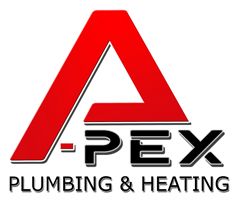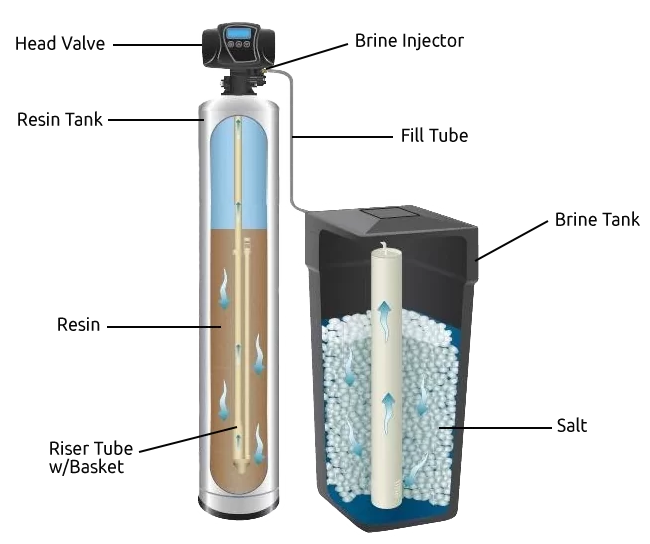Water Softeners
Water is a fundamental resource for life, essential for drinking, cooking, cleaning, and more. However, the quality of water can vary significantly depending on where you live. One common issue homeowners face is hard water, which can lead to a variety of problems in the home. This is where water softeners come into play.
Understanding Hard Water
Hard water has a high mineral content, primarily calcium and magnesium. These minerals are dissolved into the water as it passes through soil and rocks. While hard water is not harmful to health, it can cause a range of issues:
- Scale Build-Up: Calcium and magnesium can form scale deposits in pipes, water heaters, and other appliances. This scale build-up reduces efficiency and can lead to costly repairs or replacements.
- Reduced Soap Efficiency: Hard water reduces the effectiveness of soaps and detergents, leading to more soap scum and residue on dishes, clothing, and skin.
- Water Heater Inefficiency: Scale build-up in water heaters can reduce their efficiency and lifespan, leading to higher energy bills and potential breakdowns.
- Skin and Hair Issues: Hard water can make skin feel dry and itchy and can leave hair looking dull and lifeless.
- Stains and Spots: Hard water can leave stains on sinks, toilets, and glassware, requiring frequent cleaning.
What is a Water Softener?
A water softener is a device designed to remove the calcium and magnesium ions from hard water, replacing them with sodium or potassium ions. This process effectively “softens” the water, making it less likely to cause the problems associated with hardness.
Types of Water Softeners
There are several types of water softeners available, each with its own set of advantages and disadvantages:
- Salt-Based Ion Exchange Softeners
This is the most common type of water softener. It uses a resin bed that exchanges calcium and magnesium ions with sodium ions. The system periodically regenerates the resin bed using a brine solution. - Salt-Free Water Softeners: These systems use a different technology called Template-Assisted Crystallization (TAC) to prevent calcium and magnesium from forming scale. They do not remove the minerals but alter their form to prevent scale build-up.
- Dual-Tank Water Softeners: These systems have two tanks, allowing one tank to be in use while the other is being regenerated. This ensures a continuous supply of softened water.
- Magnetic and Electronic Water Softeners: These devices use magnetic or electronic fields to alter the properties of the minerals in the water, aiming to reduce scale build-up. Their effectiveness is debated, and they may not offer the same results as traditional softeners.
- Reverse Osmosis Systems: While primarily used for filtration, some reverse osmosis systems include a water softening feature. They remove a broad range of contaminants in addition to reducing hardness.
How Water Softeners Work
Ion Exchange Process
The primary method used by most water softeners is ion exchange. Here’s a step-by-step explanation of how it works:
- Hard Water Infiltration: Water from your home’s supply line enters the water softener system.
- Ion Exchange Resin: The water passes through a tank filled with resin beads coated with sodium ions. As the water flows over the resin, sodium ions replace the calcium and magnesium ions.
- Softened Water Output: The resulting water, now with a lower concentration of calcium and magnesium, exits the softener and you distribute it throughout your home.
- Regeneration: Over time, the resin beads become saturated with calcium and magnesium ions. The system then enters a regeneration cycle, flushing a brine solution through the resin tank to replace the accumulated calcium and magnesium with sodium ions, restoring the resin’s softening capacity.
Regeneration Cycle
The regeneration cycle is a crucial part of maintaining a water softener. It typically involves several stages:
- Backwash: The resin tank is flushed with water to remove any debris and dirt.
- Brine Draw: A concentrated brine solution from the salt tank is drawn into the resin tank. The sodium ions from the brine replace the calcium and magnesium ions on the resin beads.
- Rinse: The resin tank is rinsed with water to remove excess brine and to prepare the resin for the next cycle.
- Recharging: The system returns to normal operation, and the cycle is ready to start again.
Benefits of Water Softeners
Investing in a water softener can provide numerous benefits, including:
- Extended Appliance Life: Soft water reduces scale build-up in appliances like dishwashers, water heaters, and washing machines, leading to fewer repairs and longer lifespans.
- Improved Cleaning Efficiency: Soft water enhances the effectiveness of soaps and detergents, leading to cleaner dishes, laundry, and surfaces with less soap scum and residue.
- Energy Savings: By preventing scale build-up in water heaters and other appliances, soft water can lead to lower energy consumption and reduced utility bills.
- Better Skin and Hair Health: Soft water can improve skin and hair condition, making them feel smoother and healthier.
- Reduced Stains and Spots: Soft water minimizes the occurrence of stains and spots on sinks, toilets, and glassware, making cleaning easier.
Choosing the Right Water Softener
When selecting a water softener, several factors should be considered:
- Water Hardness
Determine the hardness of your water by testing it. This will help you choose a water softener with the appropriate capacity. Hardness is usually measured in grains per gallon (gpg) or parts per million (ppm). - Household Size
Consider the size of your household and the amount of water you use. Larger households with higher water usage may require a water softener with a higher capacity or a dual-tank system. - Water Usage
Calculate your daily water usage to ensure the softener you choose can handle it efficiently. Look for models that match your water consumption needs. - Regeneration Frequency
Consider how often the softener will need to regenerate. Some systems have more frequent regeneration cycles, which can affect salt usage and maintenance. - Space and Installation
Assess the available space in your home for installing the water softener. Some systems may require more space or specific installation requirements. - Budget
Water softeners come in a range of prices. Consider your budget, but also weigh the long-term benefits and savings associated with investing in a high-quality system. - Maintenance
Different water softeners require varying levels of maintenance. Ensure you are comfortable with the maintenance requirements of the system you choose.
Installation and Maintenance
Installation
Installing a water softener typically involves connecting it to your home’s water supply and setting it up for proper operation. While some homeowners may choose to install the system themselves, it is often recommended to hire a professional plumber to ensure correct installation and optimal performance.
Maintenance
Regular maintenance is essential to keep your water softener functioning properly. This includes:
- Checking Salt Levels: Regularly check the salt levels in the brine tank and refill as needed.
- Cleaning the Resin Tank: Periodically clean the resin tank to remove any accumulated debris or sediment.
- Inspecting for Leaks: Check for any leaks or issues with the system’s connections.
- Scheduling Professional Servicing: Arrange for professional servicing as recommended by the manufacturer to ensure the system remains in good condition.
Environmental Considerations
Water softeners can have environmental impacts, particularly related to salt usage and wastewater. Salt-based systems discharge brine into the wastewater, which can affect the environment if not properly managed. Salt-free systems and alternative technologies may offer more environmentally friendly options, though their effectiveness can vary.
Conclusion
Water softeners are an effective solution for mitigating the problems associated with hard water. By understanding how they work, the benefits they offer, and how to choose and maintain the right system, you can ensure that your home enjoys the advantages of softened water. Whether you are dealing with scale build-up, soap scum, or other issues caused by hard water, investing in a water softener can improve your quality of life and extend the lifespan of your appliances and fixtures.

